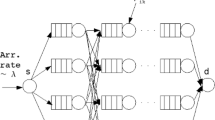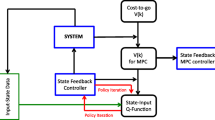Abstract
In order to solve the problem that Q-learning can suffer from large overestimations in some stochastic environments, we first propose a new form of Q-learning, which proves that it is equivalent to the incremental form and analyze the reasons why the convergence rate of Q-learning will be affected by positive bias. We generalize the new form for the purpose of easy adaptations. By using the current value instead of the bias term, we present an accurate Q-learning algorithm and show that the new algorithm converges to an optimal policy. Experimentally, the new algorithm can avoid the effect of positive bias and the convergence rate is faster than Q-learning and its variants on several MDP problems.
Access this chapter
Tax calculation will be finalised at checkout
Purchases are for personal use only
Similar content being viewed by others
References
Auer, P., Cesa-Bianchi, N., Fischer, P.: Finite-time analysis of the multiarmed bandit problem. Mach. Learn. 47(2–3), 235–256 (2002)
Azar, M.G., Munos, R., Ghavamzadeh, M., Kappen, H.J.: Speedy Q-learning. In: Proceedings of the 24th International Conference on Neural Information Processing Systems, pp. 2411–2419. Curran Associates Inc. (2011)
Bellman, R.: Dynamic Programming. Courier Corporation, North Chelmsford (2013)
Bertsekas, D.P.: Stable optimal control and semicontractive dynamic programming. SIAM J. Control Optim. 56(1), 231–252 (2018)
DEramo, C., Restelli, M., Nuara, A.: Estimating maximum expected value through gaussian approximation. In: ICML, pp. 1032–1040 (2016)
Even-Dar, E., Mansour, Y.: Learning rates for Q-learning. JMLR 5, 1–25 (2003)
van Hasselt, H.P.: Double Q-learning. In: NIPS, pp. 2613–2621 (2010)
van Hasselt, H.P.: Insights in reinforcement learning: formal analysis and empirical evaluation of temporal-difference learning algorithms. Ph.D. thesis, Utrecht University, Netherlands (2011)
Kearns, M., Singh, S.: Finite-sample convergence rates for Q-learning and indirect algorithms. In: NIPS, pp. 996–1002 (1999)
Lee, D., Powell, W.B.: An intelligent battery controller using bias-corrected Q-learning. In: Proceedings of the Twenty-Sixth AAAI Conference on Artificial Intelligence, 22–26 July 2012, Toronto, Ontario, Canada, pp. 316–322 (2012)
Littman, M.L., Szepesvári, C.: A generalized reinforcement-learning model: convergence and applications. In: ICML, vol. 96, pp. 310–318 (1996)
Pandey, S., Chakrabarti, D., Agarwal, D.: Multi-armed bandit problems with dependent arms. In: Proceedings of the 24th International Conference on Machine Learning, pp. 721–728. ACM (2007)
Singh, S., Jaakkola, T., Littman, M.L., Szepesvári, C.: Convergence results for single-step on-policy reinforcement-learning algorithms. Mach. Learn. 38(3), 287–308 (2000)
Sutton, R.S., Barto, A.G.: Reinforcement Learning: An introduction, vol. 1. MIT Press, Cambridge (1998)
Szepesvári, C.: The asymptotic convergence-rate of Q-learning. In: NIPS, pp. 1064–1070 (1997)
Watkins, C.J.: Learning from delayed rewards. Robot. Auton. Syst. 15(4), 233–235 (1989)
Wiering, M., Van Otterlo, M.: Reinforcement Learning. Adaptation, Learning, and Optimization, vol. 12. Springer, Heidelberg (2012). https://doi.org/10.1007/978-3-642-27645-3
Yu, H., Bertsekas, D.P.: Q-learning and policy iteration algorithms for stochastic shortest path problems. Ann. Oper. Res. 208(1), 95–132 (2013)
Zhang, Z., Pan, Z., Kochenderfer, M.J.: Weighted double Q-learning. In: IJCAI, pp. 3455–3461 (2017)
Acknowledgments
This work was funded by National Natural Science Foundation (61272005, 61303108, 61373094, 61502323, 61272005, 61303108, 61373094, 61472262). We would also like to thank the reviewers for their helpful comments. Natural Science Foundation of Jiangsu (BK2012616), High School Natural Foundation of Jiangsu (13KJB520020), Key Laboratory of Symbolic Computation and Knowledge.
Author information
Authors and Affiliations
Corresponding author
Editor information
Editors and Affiliations
Rights and permissions
Copyright information
© 2018 Springer Nature Switzerland AG
About this paper
Cite this paper
Hu, Z., Jiang, Y., Ling, X., Liu, Q. (2018). Accurate Q-Learning. In: Cheng, L., Leung, A., Ozawa, S. (eds) Neural Information Processing. ICONIP 2018. Lecture Notes in Computer Science(), vol 11303. Springer, Cham. https://doi.org/10.1007/978-3-030-04182-3_49
Download citation
DOI: https://doi.org/10.1007/978-3-030-04182-3_49
Published:
Publisher Name: Springer, Cham
Print ISBN: 978-3-030-04181-6
Online ISBN: 978-3-030-04182-3
eBook Packages: Computer ScienceComputer Science (R0)




